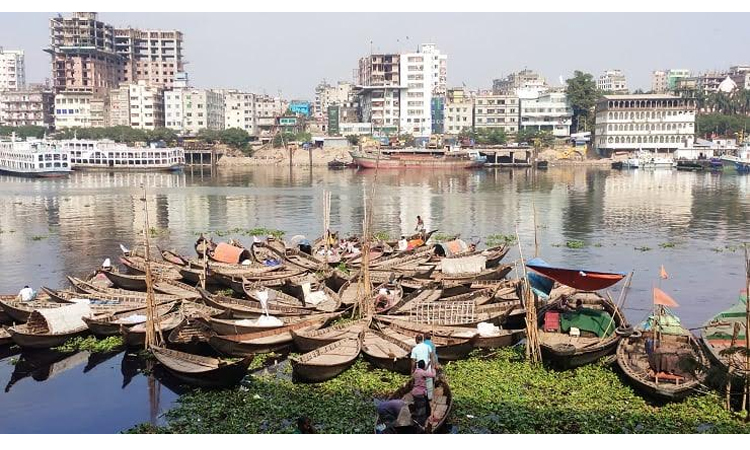News Flash

By Mah Alam
JAHANGIRNAGAR UNIVERSITY, July 22, 2025 (BSS) - A recent study has revealed alarming levels of heavy metal contamination in the Buriganga River, posing significant threats to both the environment and public health in and around Dhaka city.
The study, titled 'Heavy Metal Contamination in the Buriganga River, Bangladesh: A Review of Ecological Risk and Pollution,' was conducted by Beauty Akter and Professor Dr Syed Hafizur Rahman from the Environmental Sciences Department at Jahangirnagar University (JU).
The study was published in the June 2025 edition of the Jahangirnagar University Environmental Bulletin.
Drawing on a wide range of peer-reviewed research, the study presents a comprehensive analysis of the concentrations of heavy metals in the river's water and sediment and assesses the associated ecological risks.
According to the findings, dangerously high levels of toxic metals including lead (Pb), cadmium (Cd), chromium (Cr), mercury (Hg), arsenic (As), zinc (Zn), nickel (Ni), copper (Cu), and iron (Fe) have been detected, particularly in areas near unregulated industrial discharge points. Many of these concentrations exceed both national and international safety thresholds.
The study identifies tannery waste, textile and dyeing factories and chemical industries as the primary contributors to this pollution, particularly in the Hazaribagh and Kamrangirchar areas. Additional sources include untreated domestic sewage, roadside runoff, agricultural discharge, and open solid waste dumping.
Using internationally accepted tools such as the Contamination Factor (CF), Pollution Load Index (PLI), and Ecological Risk Index (ERI), the study classifies chromium and lead as posing "high to very high" ecological risks. Cadmium, mercury, and arsenic were also found to be significant threats in several river zones.
"The Buriganga River has essentially become a dumping ground for hazardous waste," said lead author Beauty Akter. "Heavy metal buildup in sediments and water presents long-term dangers for aquatic life and human health alike."
"These metals are not only persistent in the environment but also bioaccumulative," the study warns, noting that they can build up in aquatic organisms and enter the food chain ultimately endangering human populations who rely on the river for washing, irrigation and even household uses.
Despite having environmental regulations such as the Environment Conservation Act (1995) and the Environment Conservation Rules (1997), the study criticizes the weak enforcement mechanisms in place, particularly in Dhaka's river zones.
"Unchecked industrial growth without adequate planning and waste treatment facilities is a key driver of this crisis," said Beauty Akter. "Without immediate and coordinated intervention, the Buriganga's ecological functions and its value to society will continue to deteriorate."
The authors urge the government and policymakers to take immediate action by implementing key measures such as setting up effluent treatment plants (ETPs) in all polluting industries, relocating high-risk factories away from the riverbanks, establishing continuous water quality monitoring systems with modern technology, and creating buffer zones between industrial zones and water bodies.
"The government must first identify all sources of waste and develop an integrated system to prevent arbitrary disposal," said Prof Dr Syed Hafizur Rahman, the study's corresponding author. "Installing physical treatment systems to filter solid waste is a critical step toward curbing environmental degradation."
He also suggested that river dredging could help deepen the Buriganga and improve water flow and quality within two to five years.
The study recommends a multi-pronged approach to tackle the crisis, including relocating high-risk factories away from riverbanks, establishing buffer zones between industrial areas and water bodies, introducing real-time water quality monitoring systems, launching awareness campaigns targeting industry owners, municipal authorities and the general public and strengthening legal enforcement through agencies such as the Department of Environment (DoE), Dhaka City Corporation and the Ministry of Industries
The Buriganga River has historically served as a key waterway and economic lifeline for Dhaka City. However, the review warns that if current pollution trends continue, the river's ecological functions and social value will keep declining.
The study concludes by calling for integrated water resource management policies that include pollution control and ecological restoration.